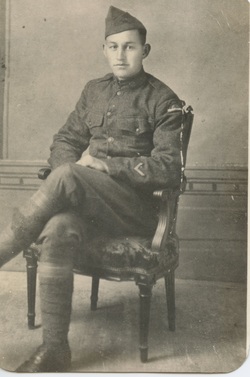
My grandfather, Henry Grady Counts, has been dead for nearly thirty years. And now that I can have him only in my memory, I see him in the posture that was most peculiar to him during the years I visited his tobacco farm. He is sitting on the edge of his cane-seated rocking chair on the porch in Powder Branch, Tennessee. In my memory, just as in life, he wears bib denim overalls, a plaid shirt with the sleeves rolled over his elbows and a pair of boots with heels caked in rich black dirt from the tobacco fields. He peels tart, green pie apples in thin, perfect spirals as if one broken strip might disturb evolution. As a child this carefulness seemed strange and intimidating to me as I watched the peels drop into his bucket to slop the hogs. When I asked to help, he let me. He watched for a moment, then took the knife away and said, “You waste too much.” I fought tears. I so wanted to please him. My grandfather had lived, and tried to support his family, through the Great Depression. While I, a baby boomer, had known relative abundance. He was right. I wasted too much.
Twenty-five years after the apple peeling, and the last time I saw him alive, he stood on a July hillside in Elizabethton, Tennessee. The grass was as green as those apples he used to peel. I snapped his photograph with his three sons and my mother, his only daughter. My mother was in the advanced stages of terminal cancer and I knew it would be the last time they’d stand together in this life. The sun danced off my grandfather’s silver hair as he was placed, like a child, between his own children. In that strange reversal that comes upon the very old, his skin was a soft as the skin of a baby.
It was all there that day—the journey, the mystery, the cyclic nature of all life, or so it seems now as I’m transported back to that old farmhouse in Tennessee by this Oregon light dancing among the shadows of the conifers and summer oaks in my own yard. My grandfather seemed old and young at the same moment—somehow beyond the reach of time. But that was illusion, and I knew, even then, I’d never see him again.
Once there was an abundance of sound in my grandfather’s house. The summers were filled with tobacco harvest and reunion. I played with my cousins outside where lamplight fell in expansive circles on the ground. Talk and laughter of the adult people rose up around us and carried away into the darkness as we kids ate watermelon and caught fireflies in Mason jars with holes punched into their lids.
Now that he has left this life behind him, there will be funeral silence in the rooms, the endless wake of some final word. His pie apples will lie rotting on the lawn. The walls will close in on my grandfather’s house just as they have on his life. Each time I return, it will be in mourning and I will see just how small that old farmhouse was. I’ll walk up the long hill to the cemetery and there, just as it should, will lay my grandfather’s grave.

 RSS Feed
RSS Feed